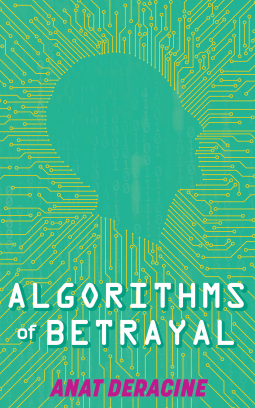

I found Algorithms of Betrayal by Anat Decine on NetGalley. This book took a while to grow on me, but once I got into it, I was hooked. I’m chalking my initial reticence up to my baggage working in and around technology for 20+ years. Initially, it felt like this might be a superficial story about tech bros and their infinite moral and social failings.
Don’t get me wrong, the book has plenty of that kind of drama. The main character, Ryan Archaki is neurospicy-coded as a brilliant, germaphobic asshole with mommy issues and whatever is the opposite of emotional intelligence. His ex-girlfriend, Amy, is an executive at the company he founded (and was recently fired from). She waffles between being direct and competent in her public life and spending most of the novel privately mooning over Ryan. Then, there’s Mark, Ryan’s former college roommate, lifelong friend, and a ‘golden boy’ of tech who took over the CEO role after Ryan was ousted. Joining these three is a cast of characters easily recognizable to anyone who has spent time in the tech industry: ambitious, politically motivated, ranging in ages between Gen Z and Gen X, ethnically diverse, but all slightly obsessed with the cult that is their company. These personalities can sometimes come off as stereotypical, but I’ve met all these people at some point in my career, and stereotypes aren’t always inaccurate.
Yes, Algorithms of Betrayal is a story of corporate intrigue, hacker culture, and intelligent, self-interested people. But it turns out to be a lot deeper. The relationships between these characters prove fertile ground for reflection on what it means to be a friend, a lover, and a co-worker. As the title implies, trust is a big theme in this story. His company’s board fired Ryan, only to have his best friend step into the role. Amy dates Mark, only to break up with him after he becomes CEO and she has a miscarriage that she keeps from him. Ryan found out that one of the people who reached out to him after he left the company was part of why he got fired. All this cloak-and-dagger BS that large companies are riddled with. It’s hard for the reader to know who to trust, much less the characters themselves.
The book isn’t highly technical, but Decine knows her stuff. She understands the threats inherent in AI technology and the industry that is rushing head-first toward its applications in all sectors of society. The book does a great job of ‘teaching’ the reader about the technology without it becoming dull or encyclopedic. That is, the debate around AI and the people impacted by it is presented naturally, through conversations between characters as opposed to boring technical descriptions. The stakes for each character (even minor ones) hinging on the development of AI are clear. This is an impressive feat considering that even people currently developing AI don’t necessarily grasp how it works, or its long-term impacts.
The public conversation around AI has been frustrating for many of us as we’ve watched society take sides in a discussion about which absolutely no one has any clarity. Rather than taking the “good vs. evil” approach and allowing the book’s narrative to champion or condemn the technology outright, Decine challenges us to consider its societal implications from multiple angles. If you’re the kind of person who needs their fiction to tell them what to think about a topic and assign moral value to it, you may find this book challenging. I, however, adore moral ambiguity in my fiction, and this book is chock-full.
Tension increases as Ryan, Amy and Mark’s relationship begins to unravel; At the same time, all three are engaged in a highly public security breach that started as Ryan’s revenge for his ouster via a backdoor he’d installed in the code of the SaSS that his company sells for AI-generated advertising. Hijinks ensure, and eventually, they are all pulled into an international incident involving a foreign hacker ring and the deep state. It’s fun.
Decine deserves credit as a writer. This book has multiple messages and layers to the plot, but it doesn’t feel muddy. Everything folded in nicely in the end, and it left me satisfied. Despite all the characters being flawed (and sometimes annoyingly one-note), they weren’t caricatures. There was plenty to empathize with in all of them.
I’ve not read anything else by Anat Decine but after reading Algorithms of Betrayal, I’m going to search for more.

